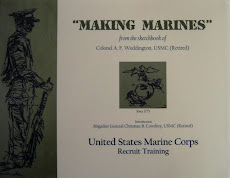by Andy Weddington
Saturday, 29 March 2014
"A Marine on duty has no friends."
Sentry duty is a reality of military service. It is necessary. The purpose of every post to preserve good order, to protect government property and life, and to sound alarm. Sentry duty is serious business and more serious still when a firearm is issued to carry out duties.
Monday past, late night, Master-at-Arms 2nd Class Mark Mayo, U. S. Navy was killed in the line of duty. His selfless actions, ironically, life-saving. But his death should not have happened.
The killer (reported to be a man with credentials who accessed base driving a truck rig) somehow got close enough to an armed Sailor on watch to overwhelm, take her firearm, and kill Petty Officer Mayo, who was responding to assist, before he (the intruder) was in turn killed.
Anyone with experience as an armed sentry is puzzled.
Though still under investigation the incident, involving the USS Mahan (in port Naval Station Norfolk), begs basic questions about force protection - from leadership to gate security to front line sentries competently carrying out, first and foremost, General Orders.
To review the 11 General Orders...
1. To take charge of this post and all government property in view.
2. To walk my post in a military manner, keeping always on the alert and observing everything that takes place within sight or hearing.
3. To report all violations of orders I am instructed to enforce.
4. To repeat all calls from posts more distant from the guard house than my own.
5. To quit my post only when properly relieved.
6. To receive, obey, and pass on to the sentry who relieves me all orders from the commanding officer, field officer of the day, officer of the day, and officers and noncommissioned officers of the guard only.
7. To talk to no one except in the line of duty.
8. To give the alarm in case of fire or disorder.
9. To call the petty officer of the watch in any case not covered by instructions.
10. To salute all officers and all colors and standards not cased.
11. To be especially watchful at night, and during the time for challenging, to challenge all persons on or near my post, and to allow no one to pass without property authority.
The General Orders are clear.
Numerous orders were violated. General Order 11 is especially germane.
For example, from the 'Guidebook for Marines' (certainly all services have similar particulars) sub paragraph a. If a sentry observes a person approaching his post during the time for challenging, he calls, "HALT: Who is there?" while the person is still far enough away for the sentry to take effective measures should the person rush him after being challenged. Before challenging, the sentry places himself in the most advantageous covered and/or concealed position from which to identify, detain, or apprehend the person or party. (And the particulars go on and in sub sub paragraphs detailing sentry actions.)
Had the Sailor on duty carried out those General Orders, specifically number 11, Petty Officer Mayo would most likely be alive.
And the only person dead would have been the man - for not complying with the sentry's instruction, "HALT: Who is there?"
Again, the purpose for a sentry to carry a firearm is to preserve order and to protect government property and life and to use the weapon as an emergency alarm if no other method is available.
For a sentry to have their weapon taken from them is ridiculous. It is sloppy. It is gross dereliction of duty. That a Sailor died makes it criminal.
Further, loss of life could have been worse - catastrophic. What if the man had killed more Sailors or his truck had been a bomb?
The most important lesson?
That though most duty is without incident, and routine can be boring and lead to complacency, ever is the possibility of attack. Sentries must carry out orders to the letter.
Accountability there must be - not just at the sentry level but throughout the chain of command. For the incident suggests there may be greater issues with training and officers (not) inspecting and testing training.
A Marine on duty has no friends. Nor does a Sailor on duty have friends.
Whatever investigative outcomes (e.g., charges of dereliction of duty; relief for cause [failed leadership]; new sentry training and procedures to test; etc.), Petty Officer Mayo's actions exemplified Navy Core Values: Honor. Courage. Commitment.
Master-at-Arms 2nd Class Mark Mayo, U. S. Navy
Decorate Petty Officer Mayo - a courageous soul doing his duty - with the Navy Marine Corps Medal (highest non-combat decoration for heroism).
But, my god, what a sickening and senseless tragedy.
Post Script
The intruder should have been shot before getting near the sentry (who survived). No doubt, a Marine would have shot them.















2 comments:
I hope a Marine would have shot him, but I wonder. In this day and age of convicting before trial you have to wonder if a sentry will automatically react to his orders or begin to think of possible consequences he/she may face. Our people have had their "six" exposed too often in recent memory.
Bob Martin
Lt. Col. USMC (Ret.)
I have to agree with LtCol Martin. There have been too many instances recently where Marines were thrown under the bus by those who were supposed to have their backs. The rules of engagement everyone has become used to for the past decade is basically to wait for deadly force to be used against you before replying in kind, and even then, you'd better be sure. Even if you are sure, you're probably going to be pilloried in the court of public opinion, have an elected official on record calling you a murderer, and someone with stars on his shoulders demanding that you be run out of the service...
Post a Comment